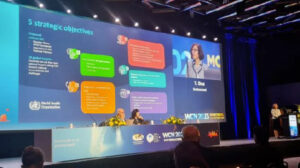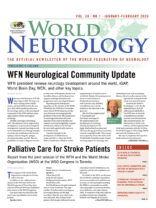Plenary speakers shared their latest research on topics such as diabetic neuropathies, Parkinson’s disease, ALS, and global health care equity.
The 26th World Congress of Neurology was held Oct. 15-19 in Montreal. This combined in-person and virtual meeting was attended by over 3,500 neurologists from 129 countries. The highlight of the meeting was a series of plenary lectures given by world experts in a variety of subjects, ranging from a rare disease to neuroepidemiology. They brought their insights into a plethora of important neurological problems, from rare diseases to the World Health Organization’s plan to address neurological diseases across the globe. Summaries and salient messages are presented below. All of the subjects covered important issues that concern neurologists and that can potentially affect billions of people around the world.
–Guy Rouleau, vice president of the WFN
 Hosted in Montreal, the 2023 World Congress of Neurology united experts to address key neurology challenges. Plenary speakers shared their latest research on topics such as diabetic neuropathies, Parkinson’s disease, ALS, and global health care equity.
Hosted in Montreal, the 2023 World Congress of Neurology united experts to address key neurology challenges. Plenary speakers shared their latest research on topics such as diabetic neuropathies, Parkinson’s disease, ALS, and global health care equity.
Dr. Tarun Dua from the World Health Organization emphasized the urgency in tackling neurological disorders, shaping a collaborative atmosphere.
The congress served as a hub for diverse perspectives and initiatives. Explore the discussions in each plenary lecture by reading the full press releases linked with each lecture.
The Global Importance of Diabetic Neuropathies
Eva Feldman, MD, PhD, James W. Albers Distinguished University Professor, and Russell N. DeJong, Professor of Neurology, University of Michigan
Type 2 diabetes has reached epidemic proportions, and complications like ulcers and amputations not only impact quality of life but also strain health care systems worldwide. During her plenary lecture, Dr. Eva Feldman cast a light on diabetic peripheral neuropathy (DPN), a major complication of diabetes and a leading cause of global disability. Discover the latest insights into the global burden of DPN and learn about the urgent need for new treatment approaches, education, and lifestyle changes to combat this worldwide challenge.
The WHO, IGAP, and Brain Health
Tarun Dua, MD, Head, Brain Health Unit, World Health Organization, Switzerland
Neurological conditions are the second-leading cause of death and the leading cause of disability worldwide. The World Health Organization’s new Intersectoral Global Action Plan provides a critical blueprint for combating neurological conditions and calls for urgent action from governments and health care organizations around the world. Dr. Tarun Dua discussed this landmark coordinated effort to tackle the challenges posed by neurological disorders, including the five key objectives for addressing these conditions worldwide and 10 global targets to be achieved by 2031.
The Epidemiology and Burden of Neurological Disorders
Valery Feigin, MD, PhD, Professor of Neurology and Epidemiology, National Institute for Stroke and Applied Neurosciences, Auckland University of Technology, New Zealand
Low- and middle-income countries currently experience a disproportionate degree of the global burden of neurological disorders. Dr. Valery Feigin revealed groundbreaking findings from the latest Global Burden of Disease (GBD) study. Learn about the top 10 neurological conditions causing 90% of global disability and see how this data can aid neurologists and global health organizations in reducing health care disparities in low- and middle-income countries.
Status of Disease-Modifying Therapy in Parkinson’s Disease
Anthony Lang, MD, Professor of Neurology, Jack Clark Chair for Parkinson’s Disease Research and Lily Safra Chair in Movement Disorders, University of Toronto, Canada
Parkinson’s disease is one of the fastest-growing neurological diseases on the planet. But what if researchers could detect signs of the disease years before symptoms start to show? During his plenary lecture, Dr. Anthony Lang presented a groundbreaking new model for identifying and studying Parkinson’s disease. This approach will help researchers investigate biological aspects of the disease that may be detectable many years before symptoms begin to show.
Clinical Trial Progress in ALS
Merit Cudkowicz, MD, Chair, Massachusetts General Hospital Department of Neurology; Director, Sean M. Healey & AMG Center for ALS, Massachusetts General Hospital; Julieanne Dorn Professor of Neurology, Harvard Medical School
One of the central challenges of amyotrophic lateral sclerosis (ALS) research is finding ways to slow the progression of this relentlessly degenerative disease. Several late-stage clinical trials in ALS have had positive results. In addition, recently, two promising experimental drugs were advanced to phase 3 clinical trials as part of the innovative HEALEY ALS Platform Trial. Dr. Merit Cudkowicz’s lecture highlighted the drugs currently being tested in the HEALEY ALS Platform Trial as well as several other recently approved ALS medications, the promise of gene therapies, and a proposed new biomarker that is aiding in the development of treatments and research.
The Rett Syndrome: From Clinics to Genetics
Huda Zoghbi, MD, Professor of Molecular and Human Genetics, Baylor College of Medicine
Rett Syndrome is a delayed-onset childhood disorder that causes a broad range of severe neurological disabilities, including loss of the ability to speak and socialize, and the development of tremors, ataxia, seizures, autonomic dysfunction, and stereotypic hand-wringing movements. In her lecture, Dr. Huda Zoghbi, MD, discussed what her lab has learned about Rett pathogenesis and the significance of MeCP2 protein levels in maintaining healthy brain function. She outlined how an insufficient amount of this protein contributes to Rett syndrome, while an excess (resulting from gene duplication) leads to another severe neurological condition.
Transformations in the Treatment of Stroke
Liping Liu, MD, PhD, Director, Neurointensive Care Unit (NICU), Neurology and Stroke Center, Beijing Tiantan Hospital, Capital Medical University, China
Stroke is a leading cause of disability worldwide. However, giving certain treatments—called reperfusion therapies—soon after the start of a stroke can dramatically improve patient outcomes and minimize long-term brain damage. Dr. Liping Liu highlighted recent advancements in stroke treatment and strategies for addressing the global burden of stroke. She presented recent research on the effectiveness of reperfusion therapies for ischemic stroke and advocated for increasing awareness and training in these types of therapies for the global neurology community.
President of African Academy of Neurology Calls for Urgent, Unified Action to Address Lack of Trained Neurologists
Dr. Augustina Charway-Felli, President of the African Academy of Neurology
Africa is faced with critical shortages of neurologists and health care funding, leading to some of the world’s highest rates of disability from neurological disorders. Dr. Augustina Charway-Felli presented a strategic plan at the WCN. The proposal underscores regional training to bolster Africa’s neurologist count and prioritizes educating primary care providers. Dr. Charway-Felli advocated for a unified approach focusing on training, reducing brain drain, increasing specialized neurologists, and public education. Interregional collaboration and WFN accredited training centers in Dakar, Senegal; Rabat, Morocco; Cairo, Egypt; and Cape Town, South Africa, are vital components. The plan aims to alleviate the severe neurologist shortage and improve neurological care accessibility in Africa.
Kathy Oliver Champions Global Action for Patient Organizations at the 26th World Congress of Neurology
Kathy Oliver, chair of the International Brain Tumor Alliance
Patient engagement is gaining prominence in healthcare with Kathy Oliver championing this movement. Oliver emphasized the pivotal role of patient organizations in shaping clinical trials, drug development, health care policy, and regulatory issues. Patient engagement enhances research quality and resource allocation by aligning with patients’ priorities. Oliver highlighted five priorities for effective patient collaboration, stressing clear expectations, focusing on patients’ perspectives, promoting mutual learning, fostering effective collaboration, and ensuring timely involvement. Central to this approach is the principle “nothing about us, without us,” advocating for patient centrality in health care decisions.
Neurologist Reveals the Hidden Neurological Consequences of Historic Pandemics
Hadi Manji, MD, Consultant Neurologist and Honorary Associate Professor at the National Hospital for Neurology, United Kingdom
Although the height of the COVID-19 pandemic may be behind us, millions of people continue to experience disabling complications like long COVID—and researchers still don’t understand the full scope of COVID-19’s impact on the brain. During the congress, Dr. Hadi Manji shed light on the neurological complications of COVID-19 by exploring similar long-term complications of global pandemics, including the Spanish flu pandemic of 1918, HIV/AIDS, and Zika virus. This enlightening lecture explored what past pandemics can teach us about diagnosing and treating current post-infection complications like HIV-associated neurocognitive disorder (HAND) and long COVID, which impact millions of people worldwide.


